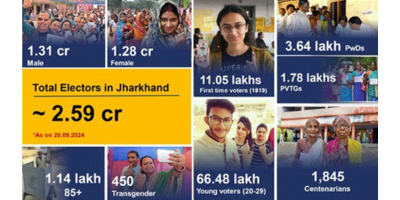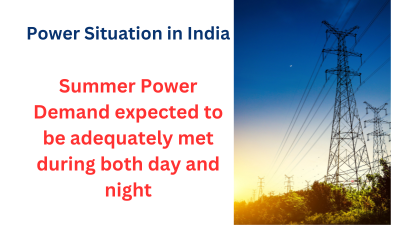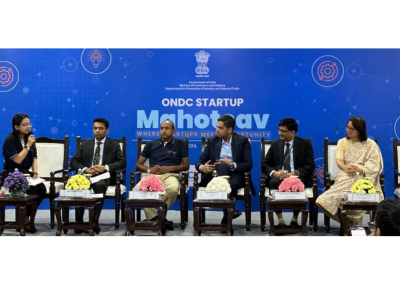Chief Election Commissioner Shri Rajiv Kumar, along with Election Commissioners Shri Gyanesh Kumar and Dr. S. S. Sandhu, conducted a thorough review of the preparations for the upcoming Assembly Elections in Jharkhand, held in Ranchi. The current term of the Jharkhand State Assembly is set to end on January 5, 2025, with elections planned for 81 Assembly Constituencies (44 General, 9 SC, 28 ST) in the state.

During the Commission’s two-day review visit on September 23-24, representatives from various national and state political parties, including the Aam Aadmi Party, Bahujan Samaj Party, Bharatiya Janata Party, Communist Party of India (Marxist), Indian National Congress, National People’s Party, AJSU Party, Jharkhand Mukti Morcha, and Rashtriya Janta Dal, met with the Commission. All parties expressed their appreciation for the successful and peaceful conduct of the 2024 Lok Sabha Elections.
- Most parties unanimously requested consideration of various festivities like Diwali, Chhath, Durga Pooja and state foundation day in the month of October and November, before deciding on the election schedule for enhanced participation in election process. It was informed that many voters in the state will be travelling during Chatth pooja.
- Many parties also requested for a single-phase election.
- Parties requested for an error free electoral rolls and to ensure a free and fair elections with non-partisan action by local civil and police administration for a level playing field.
- A proper mix of CAPF and State police for appropriate deployment at sensitive and rural booths, monitored by an IG Level Officer.
- 100 % Webcasting in all polling stations.
- Regarding polling stations, one of the parties requested availability of ramps and sufficient lights in all polling stations, along with priority in voting for elderly, PwDs and pregnant women.
- All polling stations to be set up in proximity of residential areas for convenience of voters. Pick and drop facility may be provided for polling stations set-up farther from residential areas. Accessibility Observer may be deployed for ensuring facilities at polling stations.
- One of the parties raised a concern that in some cases, members of same family residing together were allotted different polling stations and some polling stations have more than 1500 electors.
- To avoid any undue harassment by authorities, few parties raised need for clear guidelines and demarcation of area for setting up of polling desks near polling station by parties on poll day.
- One of the parties also raised concern regarding deletion of name of voters in certain constituencies in previous elections, after final publication of the electoral roll.
- One of the parties requested enquiry of a sudden increase of voters in certain Assembly Constituencies.
- Some parties raised concerns on Hate Speech during campaigning. One of the parties requested ban on raising sub-judice matters like illegal immigrants in the state during campaigning.
- Strict vigil and action on use of illicit cash, liquor and freebies to sway voters. A grievance that administration is slow to cooperate/proceed with complaints of opposition parties/candidates and there is a need for swift action on any such complaints.
- Monitoring of campaigning by candidates 24×7 for any violations and prohibiting campaigning through IVRS calls on poll day
- More awareness on ECI directions regarding display of party flags by voters voluntarily in their home after election announcement to avoid misuse of Public Defacement Act by authorities.
- Details of EVM to be used at polling stations to be given to parties/candidates. Reserve EVMs to be made available at all polling stations for smooth voting process
- Voter Information Slip to be distributed in advance for awareness
- Videography of counting of postal ballots
- Other demands included the timely sharing of voter lists with candidates; curb diversion of funds received by certain NGOs for development work towards election related campaigning and reduction in nomination fee for the contesting candidates.
The Commission assured the representatives that it has taken cognizance of suggestions and concerns of the political parties and ECI is committed to conduct free, fair, participative, inclusive, peaceful and inducement free elections in the state. The Commission after reviewing these issues, decided and conveyed the following to state and district administration:
- Beyond the Commission’s mandate of webcasting in 50% polling stations, webcasting will be done in all polling stations, wherever feasible technically.
- Assured minimum facilities including ramps, sufficient lighting, wheelchairs, and volunteers for elderly and PwD voters will be provided at all polling stations.
- Priority voting for elderly, PwDs and Pregnant women would be ensured
- Polling stations will be on the ground floor and within 2 kms of the residence of the voters. Pick and drop facility would be provided for few polling stations beyond 2km range.
- All divisional commissioners are directed to assess and ensure compliance of AMFs at polling stations.
- None of the polling station will have more than 1500 electors.
- Clear demarcation of area i.e. 200mt from the periphery of the polling station premises, where Polling Parties can set up their desks on poll day would be ensured.
- There would be no undue harassment of persons under Public Defacement Act. DEOs and SPs directed that law should be implemented equally and without any bias.
- As per ECI guidelines, EVM & VVPAT details will be shared with all contesting candidates after first and second randomization. FLC & First randomisation is done in presence of recognized parties. Second randomization of EVMs and VVPATs is conducted, before commissioning of EVMs and VVPATs, in the presence of contesting candidates to allocate polling station wise and reserve machines.
- Video recording of counting of postal ballots would be ensured as per ECI guidelines.
- District Administration would ensure vigil and prohibition on campaigning/advertisement using bulk SMS and IVRS calls during silence period.
- Voter information slips will be distributed timely
- DEOs were specifically told to be equally accessible to all political parties and to ensure prompt resolution of their complaints and grievances, apart from meeting them regularly through periodic meetings.

The Commission is taking a very comprehensive approach to ensure inducement-free elections. Here’s a concise summary of the key directives given to the enforcement agencies:
- Coordination: All agencies must work together to curb illicit activities.
- Route Maps: Update and synchronize route maps to reflect ground realities.
- Joint Teams: Form joint teams for coordinated action.
- Focus on Kingpins: Target liquor and drug kingpins and establish backward linkages.
- Border Vigilance: Review and monitor inter-state borders, especially with West Bengal, Odisha, and Bihar.
- CCTV Monitoring: Implement 24×7 CCTV monitoring at critical check posts.
- Synthetic Drugs: Monitor synthetic drugs and destroy illegal poppy cultivation.
- Highway Surveillance: Keep National Highways under close watch.
- Rail and Forest Routes: Monitor rail and forest routes.
- Intelligence Sharing: Share intelligence among agencies.
- Cash Transfers: Ensure cash transfers are done in designated vehicles during designated hours.
- Online Transfers: Vigil over illicit online cash transfers.
- Cargo Movement: Monitor cargo movement through airstrips and helipads.

The Election Commission of India (ECI), led by Chief Election Commissioner Rajiv Kumar, recently conducted a comprehensive two-day review of poll preparedness in Jharkhand. Here are the key points from their review:
Meetings with Key Officials: The Commission met with the Chief Secretary and Director General of Police to discuss overall poll preparedness and law and order. They emphasized the need for Assured Minimum Facilities (AMF) at all polling stations and regular coordination with counterparts in neighboring states.
Detailed Reviews: On the second day, the Commission held detailed reviews with District Election Officers (DEOs), Superintendents of Police (SPs), Divisional Commissioners, and Inspector Generals (IGs). They focused on ensuring free and fair elections, addressing concerns raised by political parties, and maintaining impartial conduct.
Voter Engagement: The Commission encouraged DEOs to engage voters through innovative awareness and outreach activities, such as using local culture and sports like archery and hockey. They also suggested organizing painting competitions with local tribal themes and involving local influencers for awareness activities.
Electoral Roll Revision: The Chief Electoral Officer and State Police Nodal Officer provided an overview of poll preparations, including the Special Summary Revision of Electoral Rolls. The final electoral roll was published on August 27, 2024.
The Commission’s efforts aim to ensure a smooth and peaceful election process, maintaining the highest standards of impartiality and voter engagement.
The Chief Electoral Officer (CEO) of Jharkhand has announced the completion of the 2nd Summary Revision (SSR) of the electoral roll, with July 1, 2024, as the qualifying date. The updated electoral roll was published on August 27, 2024, and copies were provided to political parties.
As of September 20, 2024, Jharkhand has a total of 2.59 crore registered electors, comprising approximately 1.31 crore male and 1.28 crore female voters. Notably, there are over 11.05 lakh first-time voters aged 18-19, 1.14 lakh senior citizens aged 85 and above, and 3.64 lakh Persons with Disabilities (PwD) voters. Additionally, more than 1,845 voters are aged 100 or older.
The state has achieved 100% enrollment of the 8 Particularly Vulnerable Tribal Groups (PVTGs), totaling 1.78 lakh voters. The focus remains on inclusive and participative elections, with District Election Officers (DEOs) directed to enhance the participation of PVTGs and tribal groups. The electoral gender ratio in Jharkhand stands at 978
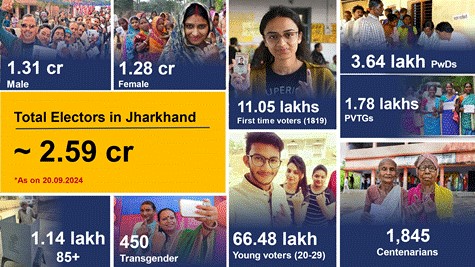
During the review, the CEO of Jharkhand provided an overview of the polling stations for the upcoming assembly elections. A total of 29,562 polling stations will be established across 20,276 locations. Of these, 24,520 will be in rural areas and 5,042 in urban areas, with an average of 872 voters per polling station.
To encourage voting among key demographics, 1,271 polling stations will be managed exclusively by women, and 139 will be managed by young employees. Additionally, 48 polling stations will be staffed by persons with disabilities.
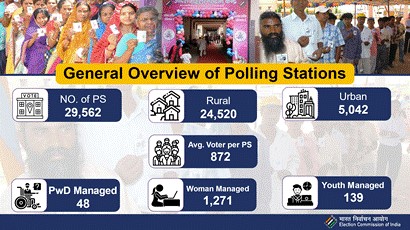
The polling stations will be well-equipped with essential facilities! Ensuring accessibility and comfort for voters is crucial for a smooth and inclusive voting process
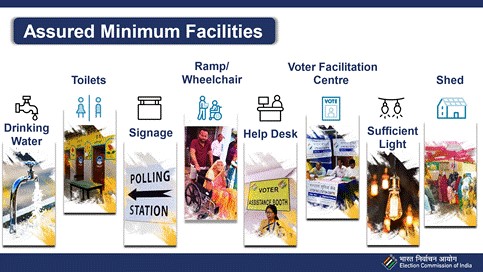
DEOs informed that they will use an ecosystem of IT Applications to facilitate all stakeholders including voters and political parties.
cVIGIL: This app allows citizens to report electoral violations and malpractices. It ensures anonymity for the complainant and promises a response within 100 minutes by deploying flying squads to address the complaints.
SUVIDHA: This is a single-window app for candidates to request permissions for meeting halls, booking grounds for political rallies, etc. It ensures a level playing field by processing requests on a first-come, first-served basis without any discretion.
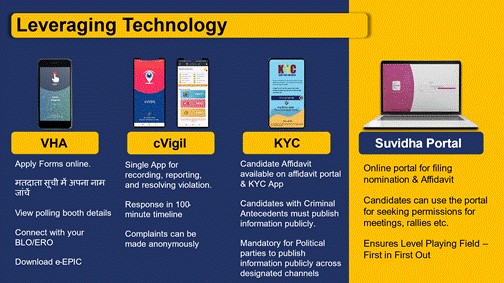
KYC or Know Your Candidate App is a step to promote an informed and aware electorate. The app contains the criminal antecedents, if any, of the candidates in the electoral fray and their assets and liabilities, educational details.
Saksham App is specially designed for PwD voters with various accessibility features built-in. One can request for Pick-n-Drop facility, wheelchair assistance, or volunteer assistance at the polling booth through this app to make the voting experience smooth for PwD voters
